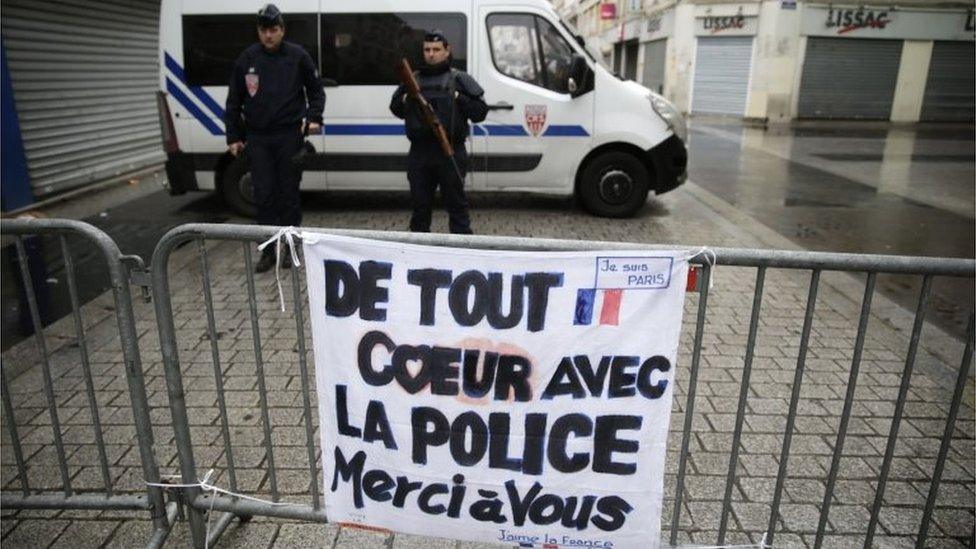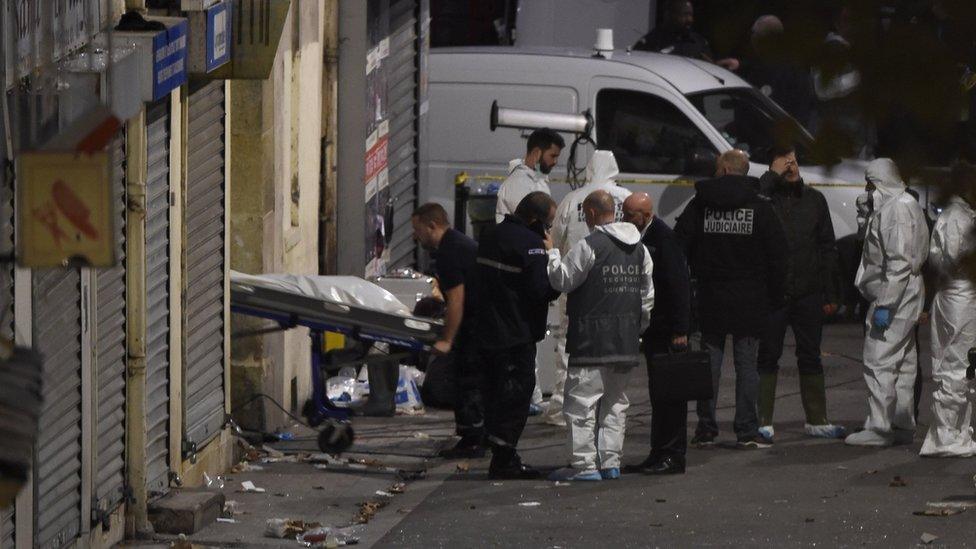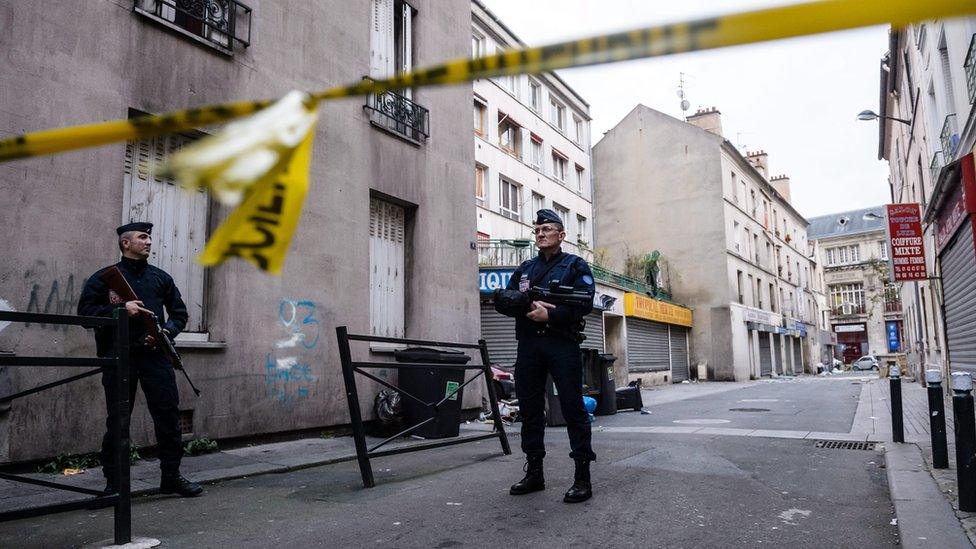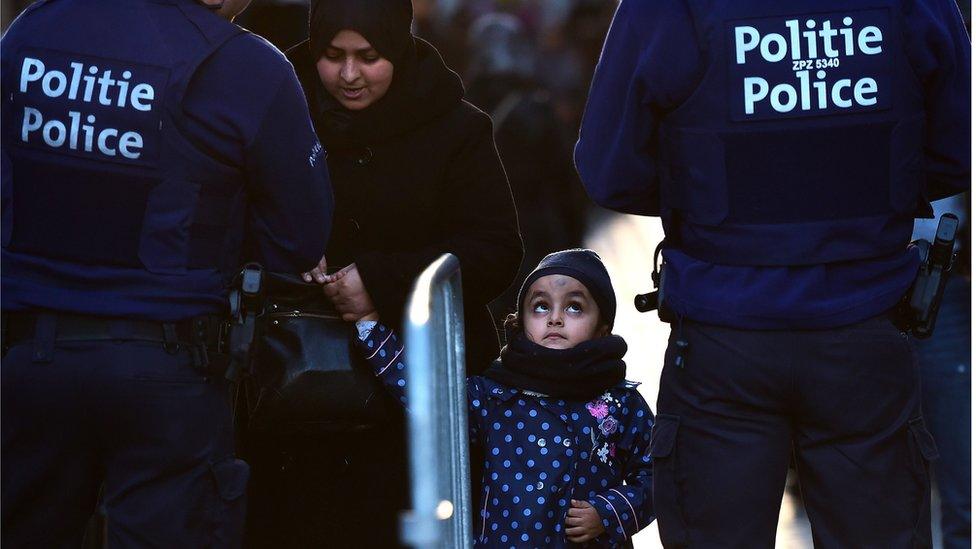Paris attacks: Belgian police raid properties linked to suspects
- Published
Tom Burridge reports from the street where police targeted the Paris attacks suspects
Belgian police have raided properties linked to suspected Paris attackers Bilal Hadfi and Salah Abdeslam.
Several raids took place in and around Brussels, and one person has been detained, Belgian prosecutors said.
French PM Manuel Valls has warned that France could face chemical or biological attack from terror groups, as deputies voted to extend the state of emergency after the attacks.
Friday's attacks in the French capital killed 129 and wounded many more.

A sign near the site of Wednesday's Saint Denis raid reads: "Wholeheartedly with the police - thank you"
Most of the raids in the Belgian capital on Thursday targeted properties in Jette and Molenbeek connected to Bilal Hadfi, a Frenchman living in Brussels who was one of the seven attackers killed in Paris.
A further raid, at an address in the Brussels district of Laeken, was linked to Salah Abdeslam - another of the attackers, who is believed to be on the run - Belgian prosecutors told the BBC.
However, the raids had been planned for some time and were not part of the manhunt, the prosecutor's office told Belgian media.
Belgian authorities were already investigating Hadfi as he was thought to have travelled to Syria.

More on the Paris attacks
A doctor's story An emergency department medic describes his Friday night shift
Rethinking strategy Time for West to review its priorities in Syria
How vulnerable is Europe? Putting the dangers in perspective
What happened in Paris? How events unfolded on Friday evening in the French capital
Hollande upstages opposition French president's tougher line on counter-terrorism
Who were the victims? Details of some of the 129 people killed
The fight against Islamic State Can a modern, open Western capital ever be totally secure?
Most wanted: Alleged mastermind Profile of key suspect Abdelhamid Abaaoud

Mr Valls addressed France's lower house of parliament before its deputies voted to extend the state of emergency by three months.
He told MPs that "terrorism hit France, not because of what it is doing in Iraq and Syria ... but for what it is".
"What is new are the ways of operating; the ways of attacking and killing are evolving all the time," the prime minister said.
"The macabre imagination of those giving the orders is unlimited. Assault rifles, beheadings, suicide bombers, knives or all of these at once."
Mr Valls also called for Europe to adopt measures on sharing information about airline passengers as a way of protecting collective security.
French police officers will be allowed to carry their weapons while off duty as long as they wear an armband to identify them, under a police directive issued to coincide with the state of emergency.
Paris police have extended their ban on gatherings and demonstrations until midnight on Sunday, although they will be allowed at the various sites attacked last Friday.
It remains unclear whether the suspected ringleader of the attacks was killed in Wednesday's police raid in Paris.
French authorities say the raid on a flat in the northern suburb of Saint Denis foiled another attack, reportedly planned for the La Defense business quarter of western Paris.

At least two bodies were removed from the apartment in Saint Denis on Wednesday

The streets around the flat remained cordoned off on Thursday
Eight people were arrested in the raid, in which police fired over 5,000 rounds of ammunition, but those detained did not include Abdelhamid Abaaoud - suspected of being the man who organised the Paris attacks.
At least two people were killed in the operation, one of them a woman who blew herself up with a suicide vest.
She is widely reported to be a cousin of Abaaoud named Hasna Aitboulachen.

Residents of the Brussels district of Molenbeek attended a vigil for the victims of the Paris attacks on Wednesday evening
Further attacks by IS were likely elsewhere in Europe, according to the head of the EU's law enforcement agency Europol.
Rob Wainwright was addressing MEPs in Brussels ahead of an emergency meeting on Friday of EU interior ministers on the Paris attacks.
Following Friday's attacks on a concert hall, cafes and the Stade de France stadium, President Francois Hollande declared a state of emergency for 12 days.
House arrest
The bill voted through by France's lower house of parliament on Thursday and the senate on Friday includes:
Extending the state of emergency for three months
Placing under house arrest anyone deemed to be a public threat
Barring suspects from communicating with each other
Allowing police to carry out searches at any time, without the prior approval of a judge, if the public is thought to be in danger
Meanwhile the Belgian Prime Minister Charles Michel has announced an extra €400m (£280m) of funding for anti-terror measures following the Paris attacks.
He told the Belgian parliament that he did not accept criticisms of Belgium's security services ahead of the Paris attacks, which France has said were prepared in Belgium.
IS said it had carried out the attacks in response to France's air campaign against its positions in Syria, and pledged further bloodshed.
France has since stepped up its air strikes against IS targets in Syria.
Both France and Russia - which is also targeting militants in Syria - are putting together draft resolutions at the UN Security Council that would lay out an international approach to defeating IS.
President Hollande has urged the council to approve a resolution on fighting IS quickly.